81% of Providers Say Social Media Is an Effective Marketing Tool, but Only If You Follow These 5 Rules
Social media can be intimidating for healthcare providers to engage professionally with these days. With the risk of medical misinformation, the more politicized nature of medicine, the volatility of some users, and the risk of cancellation, it’s clear why plenty of providers would choose to steer well clear of social media in a professional capacity.
However, the indisputable fact is that most patients are on social media, and it’s an excellent way to engage with them, share information, and market your practice—if you can avoid the landmines.
To that end, we surveyed 100 healthcare providers in the U.S.* to learn how they use social media, what rules they’ve established to protect themselves, and how effective it can be as a promotional tool for medical providers.
Use these findings and our rules of engagement to weigh the pros and cons of social media use for yourself in order to determine if it’s the right fit for your practice or your career.
Here’s what we found
81% of providers say social media is “somewhat” or “very effective” as a marketing tool for their practice.
62% of providers use social media to promote both their practice and themselves as healthcare professionals, and 69% say they have both professional and personal accounts that do not reference one another.
Facebook is the most popular social media platform for providers (67%), followed by Instagram (63%) and LinkedIn (46%).
Over half of doctors (53%) have had a negative encounter with another user on social media.
Rule 1: Consider what you want to get out of social media
There are several possible answers to this question, and knowing what you hope to achieve by using social media is the first step to getting the most out of these platforms.
From a professional standpoint, the best way to use social media is to attract new patients, which is the biggest benefit of social media according to 66% of survey respondents. About a third of respondents say social media is a very effective method of marketing their practice.
There are hundreds of millions of Americans with Facebook accounts today [1], which makes it (and other social media platforms like it) a fantastic tool for engaging with those patients. By providing the right content (which we’ll talk about later), you can educate, empower, and entice those potential patients to visit your practice.
Another valuable social media use for healthcare providers is to stay in the loop on emerging trends and network with other providers.
In our survey, 81% of providers say they follow other providers on social media, both in their own specialty and in other areas of medicine.
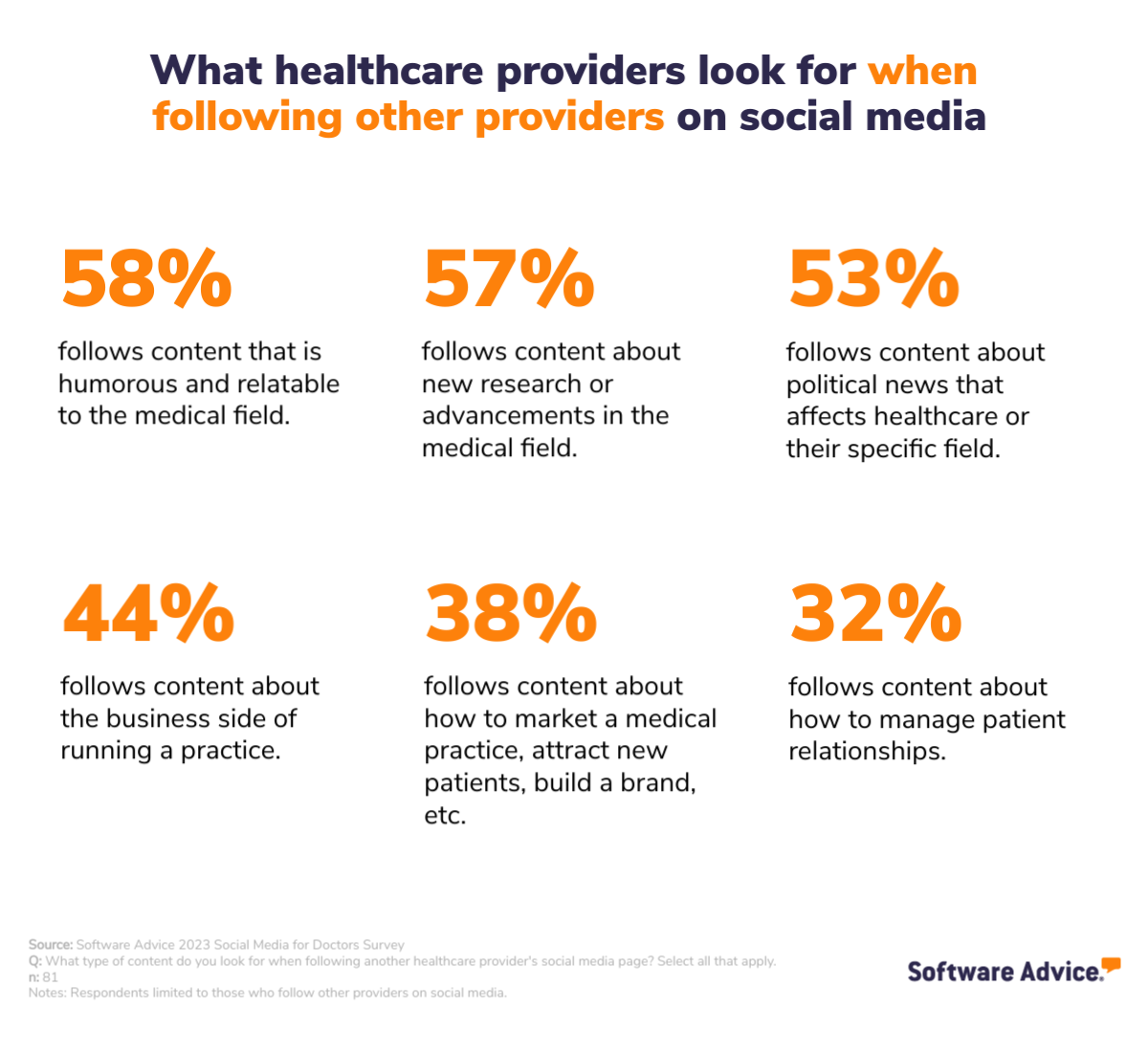
The types of content medical professionals look for from other providers varies quite a lot, but the common theme is that users want to relate to others in their own chosen career to find solidarity, advice, or even just share a laugh.
The bottom line
Social media is great for finding new patients, news related to your field, advice from other doctors, or even just common ground. Knowing what you want to get out of it is a good first step to engaging other users as a professional.
Rule 2: Know what kind of content users want to see from you
An added benefit of knowing what type of content you look for from other providers is that it will help you understand what type of content patients are looking for from you.
This can also vary depending on how you’re using social media. For example, you could be:
Posting from an account with your personal name on it with the intention of promoting yourself as a medical expert and healthcare professional, or
Posting from an account under your practice name with the intention of promoting your entire practice to potential patients.
Most users in our survey who post on behalf of their entire practice say they post links to news topics related to their practice (72%), whereas the most common type of content posted by those under individual professional accounts are explainers for common topics related to their specialties.
However, there are some thematic overlaps that we can use to generate rules of thumb about what type of content you should be posting. Those include:
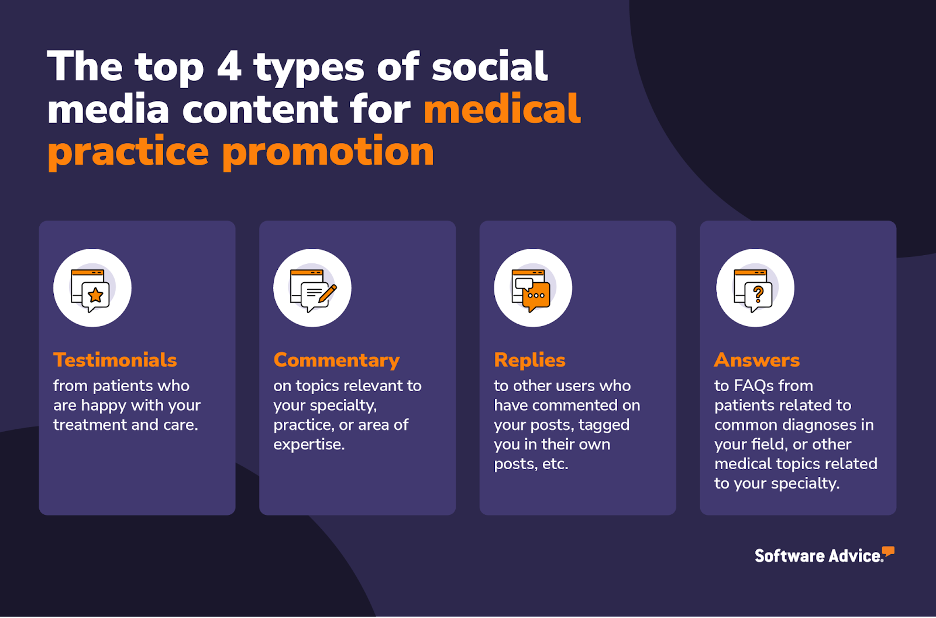
There are a lot of opportunities for patients to get confused these days. How many times have you had a patient come to you panicking about symptoms that Google told them were a lot more serious than they actually were? And how many instances of medical misinformation have you encountered online these days?
By using social media and posting data-backed information, you have a chance to head off some of that panic. Use this as an opportunity to educate your followers.
The bottom line
Consider social media an opportunity for you to acknowledge your patients’ common questions about their own health or broader medical topics. If you can provide reassuring and accurate information, your patients will recognize and appreciate that.
Rule 3: Draw a hard line between professional and personal accounts
Now that you’ve established what you want to get out of and put into social media, you should start to think about how to protect yourself from the potential risks. One of the best ways to do that is to make sure your personal and professional accounts are separate.
Most of the providers in our survey (62%) say they use social media to promote both their medical practice and themselves as professional healthcare providers. However, 69% of respondents also say they have both professional and personal accounts that never reference one another.
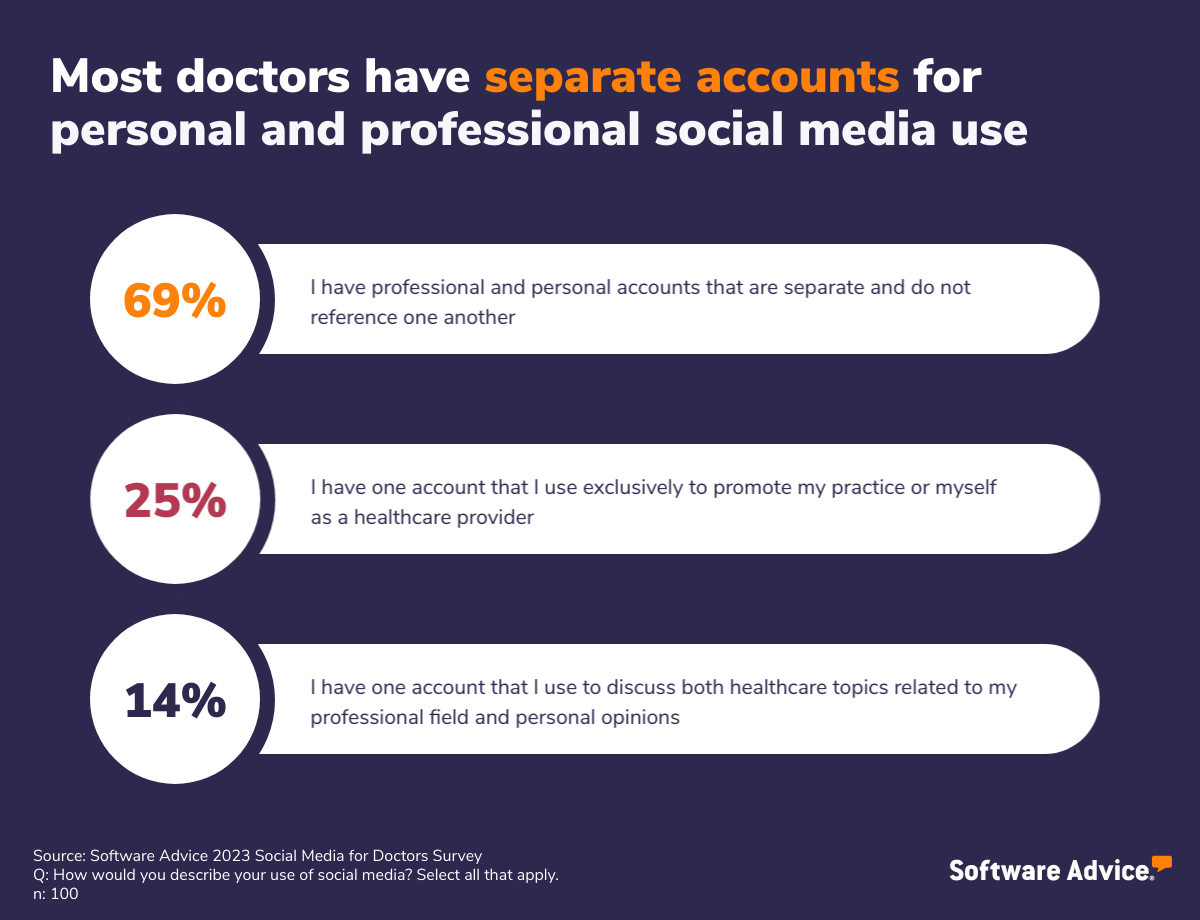
This is a very good practice for those who have concerns about sharing too much of their personal lives online.
The bottom line
By creating two accounts, you can make your professional profiles public and use them exclusively to promote yourself or your practice, and you can have a personal account set to private where you can connect with friends and family and use the platform to unwind.
Rule 4: Have a plan for handling negative encounters
While keeping personal and professional accounts separate will minimize your level of exposure, there is still a chance you may encounter a negative user online. That’s why it’s a good idea to have a plan already in place for handling this type of situation.
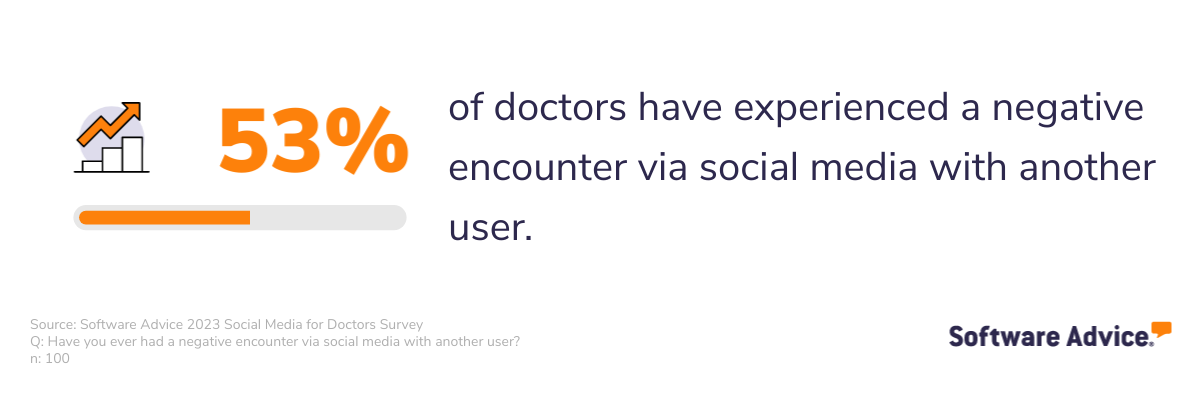
We found that 53% of providers in our survey have had a negative encounter with another user on social media. Of those respondents, the most common type of encounter involved a user the providers did not personally know who disagreed with something they posted and then commented to argue.
In these types of situations, the most important thing to remember is not to react with negativity. Remember the popular internet adage: Don’t feed the trolls.
Instead, if you choose to engage with naysayers, make it a point to respond to negativity online with calm, rational arguments. You don’t want to be a pushover or allow someone to say inaccurate things about you or your practice, but you also have to avoid letting the conversation devolve into petty name calling.
The bottom line
Negative encounters with other users are a likely occurrence, but the key is to keep your cool. Defend yourself and your practice with calm reason when necessary, but be able to recognize when further engagement is only doing more harm.
Rule 5: Use software to help manage your online reputation
Lastly, it’s a good idea to invest in tools that make managing your online presence easier and more convenient. Our survey found that 95% of providers are managing their social media account in-house, which means that’s one more task on the to-do list each day.
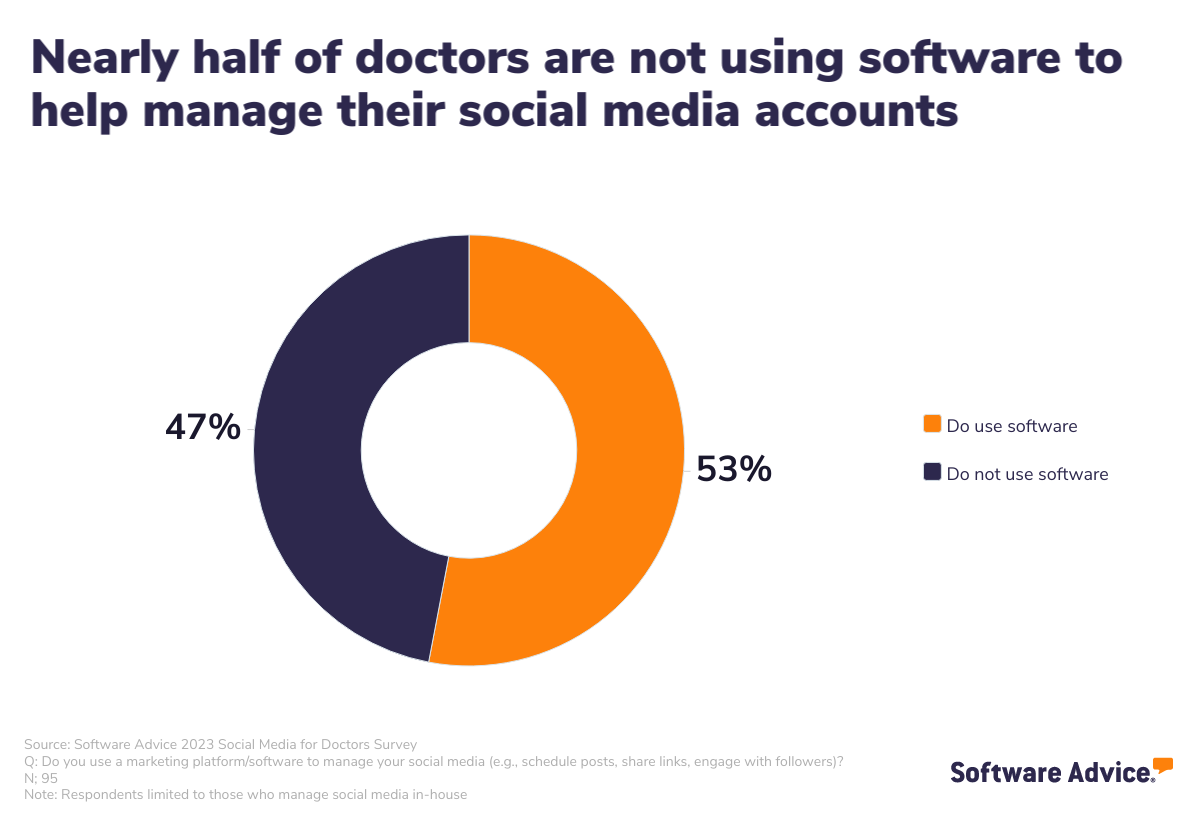
If you have also chosen to forgo a third-party service to manage your social channels, then there are two important types of software you should know about.
Provides features such as review monitoring to alert you anytime someone posts a negative review about your practice. | |
Helps you manage all of your various platforms by enabling scheduled posts and aggregating replies. |
For more information on managing your social media presence, engaging with patients, and marketing your practice, check out these guides:
The bottom line
Using social media to promote yourself or your practice should be an additive experience, not a burden. The advantages are clear, whether it’s bringing in new patients or developing your own reputation, so use tools to make running your social media accounts as easy as possible.
Survey methodology
* Software Advice's 2023 Social Media for Doctors Survey was conducted in April 2023 among 100 doctors working at practices in the U.S. The purpose of the survey was to determine how these respondents use social media in either their personal lives, their professional lives, or both. Respondents were screened for job title and limited to those who work at practices with no more than 20 licensed providers on staff.